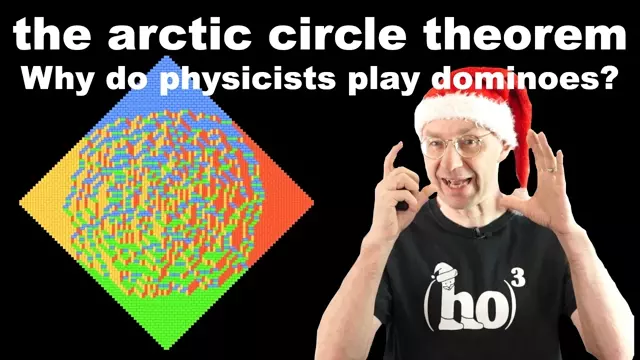2020-12-24
[public] 181K views, 10.5K likes, 101 dislikes audio only
I only stumbled across the amazing arctic circle theorem a couple of months ago while preparing the video on Euler's pentagonal theorem. A perfect topic for a Christmas video.
Before I forget, the winner of the lucky draw announced in my last video is Zachary Kaplan. He wins a copy of my book Q.E.D. Beauty in mathematical proof.
00:00 Intro
00:35 Chapter 1: mutilated chessboards
07:23 Chapter 2: Monster formula
15:12 Chapter 3: Aztec gold
20:07 Chapter 4: Square dance
30:41 Chapter 5: Ice
34:35 Chapter 6: Hexagon
38:25 Credits
40:46 Mini masterclass
In response to my challenge here are some nice implementations of the dance:
Dmytro Fedoriaka: http://fedimser.github.io/adt/adt.html (special feature: also calculates pi based on random tilings. First program contributed.)
Viktor Chlumský https://youtu.be/CCL77BUymSY (no program but a VERY beautiful animation made with the software Shadron by Victor)
Cannot fit any more links in this description because of the character limit. For lots of other amazing implementations check out the list in my comment pinned to the top of the comment section of the video.
For the most accessible exposition of iterated shuffling that I am aware of have a look at the relevant chapter in the book "Integer partitions" by Andrews and Eriksson. They also have a nice set of exercises that walk you through proofs for the properties of iterated shuffling that I mention in this video.
I used Dan Romik's old Mac program "ASM Simulator" to produce the movie of the random tilings of growing Aztec diamond boards https://www.math.ucdavis.edu/~romik/software/ Sadly this program does not work on modern Macs.
The arctic heart at the end of the video is a "chistmasized" version of an image from the article "What is a Dimer" by Richard Kenyon and Andrei Okounkov https://www.ams.org/notices/200503/what-is.pdf Thank you for letting me use this image.
Around the same time that Kasteleyn published the paper I showed in the video, the physicists Temperley and Fisher published similar results, Dimer problem in statistical mechanics-an exact result, Philosophical Magazine, 6:68, (1961) 1061-1063. The way Kasteleyn as well as Temperley and Fisher calculated the numbers of tilings of boards with square tiles was a bit more complicated than the nice refinement that I show in the video which is due to Jerome K. Percus, One more technique for the dimer problem. J. Mathematical Phys., 10:1881–1888, 1969.
Some great articles and websites to check out:
A very accessible introduction to domino and other tilings by Federico Adila and Richard Stanley http://www.claymath.org/library/senior_scholars/stanley_ardila_tilings.pdf
An accessible article about tilings with rectangles by my colleague Norm Do at Monash Uni. In particular, it's got some more good stuff about the maths of fault lines in tilings that I only hinted at in the video:
http://users.monash.edu/~normd/documents/Mathellaneous-07.pdf
A nice article about Kasteleyn's method by James Propp. Includes a proof of the crazy formula https://arxiv.org/abs/1405.2615
A fantastic survey article about enumeration of tilings by James Propp. This one's got everything imaginable domino and otherwise. Also the bibliography at the end is very comprehensive http://faculty.uml.edu/jpropp/eot.pdf
An introduction to the dimer model by Richard Kenyon
https://arxiv.org/abs/math/0310326
Alternating sign matrices and domino tilings by Noam Elkies, Greg Kuperberg, Michael Larsen, James Propp https://arxiv.org/abs/math/9201305
Random Domino Tilings and the Arctic Circle Theorem by William Jockusch, James Propp, and Peter Shor https://arxiv.org/abs/math/9801068
A website by Alexei Borodin full of amazing 3d representations of domino tilings. A must-see http://math.mit.edu/~borodin/aztec.html
James Propp's name pops up a couple of times throughout this video and in this description. He's one of the mathematicians who discovered all the beautiful arctic mathematics that I am talking about in this video and helped me get my facts straight. Check out his blog http://mathenchant.org and in particular in this post he talks a little bit about the discovery of the arctic circle phenomenon https://mathenchant.wordpress.com/2016/1/16/how-to-be-wrong/
As usual the music in the video is from the free YouTube audio library: Night Snow by Asher Fulero and Fresh fallen snow by Chris Haugen.
Today's t-shirts I got ages ago. Don't think they still sell those exact same ones. Having said that just google "HO cubed t-shirt" and "i squared keep it real t-shirt" ... :)
Jokes:
1. Aztec diamond = Crytek logo; 2. no. tilings of Arctic diamond: 2^(-1/12). 3. ℝeal mathematical magic, 4. (HO)³ : joke for mathematicians (HO)₃ : joke for chemists
Bug:
Here one of the tiles magically disappears (damn :( https://tinyurl.com/ya6mqmhh
Nice insight:
If all holes in a mutilated board can be tiled with dominoes the determinant will work. Why is that?
Merry Christmas,
burkard
/youtube/video/Yy7Q8IWNfHM?t=35
/youtube/video/Yy7Q8IWNfHM?t=443
/youtube/video/Yy7Q8IWNfHM?t=912
/youtube/video/Yy7Q8IWNfHM?t=1207
/youtube/video/Yy7Q8IWNfHM?t=1841
/youtube/video/Yy7Q8IWNfHM?t=2075
/youtube/video/Yy7Q8IWNfHM?t=2446

